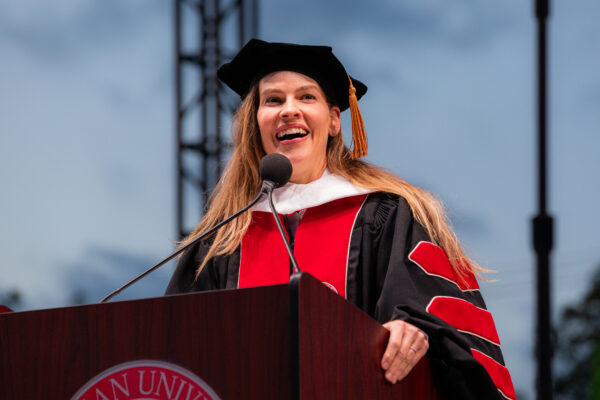A new study co-authored by Joshua Fisher, associate professor in Chapman University’s Schmid College of Science and Technology has played a crucial role in assessing the accuracy of OpenET, an advanced satellite-based system for monitoring water use by crops and ecosystems. The study, published yesterday in Nature Water, provides a thorough analysis of the accuracy of OpenET data for various crops and natural land cover types.
OpenET is a collaborative effort among government agencies, academia and industry leaders that employs satellite data to monitor evapotranspiration, an environmental process that impacts the availability of water. Professor Fisher’s satellite monitoring method is a critical component to the effort because it detects changes in evapotranspiration, which can contribute to food insecurity and access to clean water. Participating organizations include NASA, the USDA, Chapman University and Google.
Fisher emphasizes the significance of OpenET in addressing contemporary challenges related to climate change, overpopulation, and water scarcity. “Decades ago, water managers and farmers didn’t have to make many difficult decisions about our most essential resource. But climate change and overpopulation have led to a water crisis,” notes Fisher. “Luckily, OpenET, with its remarkable accuracy, guides decision-makers precisely in allocating this critical resource. The results of this paper are truly impressive in showing how accurate this system is, which should give people confidence in using OpenET for a myriad of applications.”
The study, led by scientists from the Desert Research Institute (DRI), compares OpenET data produced by 152 ground-based micrometeorological. According to Dr. John Volk, lead author of the study, “One of the biggest questions for OpenET is how accurate it is, given the magnitude and implications of the use of the data for water resource management. A lot of groups want to know what the expected rates of error are in agricultural lands, so that’s the major question that we wanted to address for this paper.”
Impressively, OpenET demonstrated high accuracy in assessing evapotranspiration in agricultural settings, especially for annual crops like wheat, corn, soy, and rice. The results were particularly reliable in arid regions like California and the Southwest, where OpenET contributes to addressing ongoing water sustainability challenges.
About Chapman University
Founded in 1861, Chapman University is a nationally ranked private university in Orange, California, about 30 miles south of Los Angeles. Chapman serves nearly 10,000 undergraduate and graduate students, with a 12:1 student-to-faculty ratio. Students can choose from 123 areas of study within 11 colleges for a personalized education. Chapman is categorized by the Carnegie Classification as an R2 “high research activity” institution. Students at Chapman learn directly from distinguished world-class faculty including Nobel Prize winners, MacArthur fellows, published authors and Academy Award winners. The campus has produced a Rhodes Scholar, been named a top producer of Fulbright Scholars and hosts a chapter of Phi Beta Kappa, the nation’s oldest and most prestigious honor society. Chapman also includes the Harry and Diane Rinker Health Science Campus in Irvine. The university features the No. 4 film school and No. 60 business school in the U.S. Learn more about Chapman University: www.chapman.edu.




